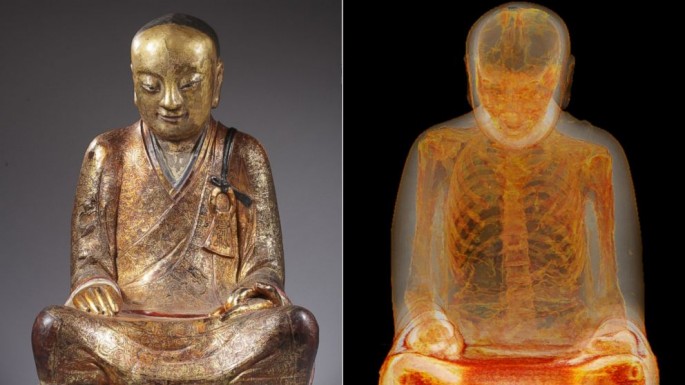Representatives from Yangchun Village, Datian County in Fujian Province, have hired a team of lawyers to sue Oscar van Overeem, a Dutch collector, over a mummified Buddha statue in his possession that he refuses to return to the village, according to a report by the Global Times.
The village representatives have signed an agreement with seven lawyers to bring the case to Dutch court, hoping to retrieve the statue that they believe was stolen from their village 20 years ago.
The statue is of Zhanggong Zhushi, a local monk who became a Buddha and is known for helping people with disease and spreading Buddhist teachings.
After his death at the age of 37, his body was mummified and placed in the statue, which has been worshipped in the village ever since.
The statue was worshipped as a god in the village for around a thousand years, according to Lin Wenqing, Party chief of the village.
The mummified statue was displayed at a "Mummy World" exhibition at the Hungarian Natural History Museum that opened in Oct. 2014. It was later pulled out following allegations it was stolen.
Initially, the village resorted to official and private channels to negotiate with van Overeem, added Lin. Van Overeem first responded by saying that he will surrender the relic "if it is proven to have belonged to a Buddhist community that still exists."
However, van Overeem has since reversed his position, believing the statue in his possession to be different from that which was stolen from Yangchun Village.
Liu Yang, who previously led a Chinese legal team in recovering relics looted from China during the Second Opium War in 1860, is leading the villagers' legal team.
According to Liu, the lawyers have already finished collecting evidence for the case and are ready to bring it to court by the end of the year.
Liu is confident because there are "no evident flaws or obstacles" in arguing that the statue was stolen from the village temple. He also added that it is imperative that the court understands the deep spiritual connection the village has with the statue in order for there to be a sense of urgency in reclaiming it.
van Overeem claims he obtained the statue in 1996. In Dutch law, the deadline for civil litigation is 20 years after the act.
"The validity period for recovering the relic is going to expire next year. So we have pressure to complete the legal work quickly," said Liu.
In December, Liu will fly to the Netherlands to work with a Dutch lawyer for the case.
Earlier in May, van Overeem told China Daily that he would return the statue to a temple near Yangchun. However, villagers noted a change of attitude from the Dutch collector, who reportedly asked for $20 billion to compensate "for the research and preservation for the Buddha statue for 20 years."
van Overeem still claims the statue did not come from Yangchun, although he admitted that it did come from China.



























